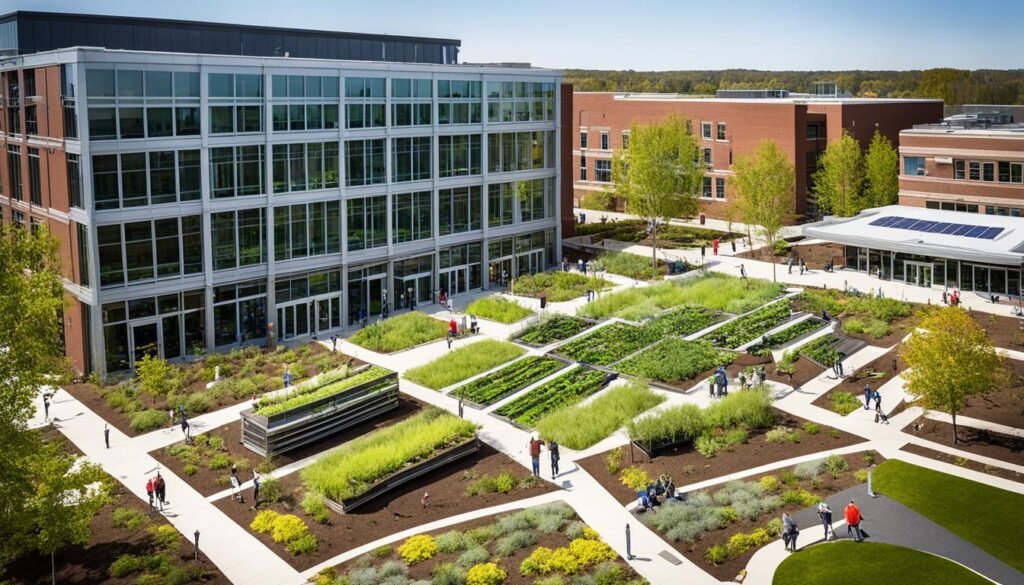Education is a powerful tool that has the ability to unleash potential, break barriers, and transform lives. In Azerbaijan, the pursuit of academic excellence is at the forefront of the nation’s vision for progress and development. With a focus on ensuring accessible education and addressing the socioeconomic factors that influence educational opportunities, Azerbaijan is paving the way for a brighter future.
As one of the fastest-growing economies in the region, Azerbaijan recognizes the importance of investing in education to foster human capital development and narrow income gaps. By providing quality education, the country is equipping its citizens with the knowledge and skills needed to thrive in a competitive global landscape.
Key Takeaways:
- Azerbaijan places great importance on accessible education and strives to provide equal opportunities for all.
- Socioeconomic factors significantly impact education outcomes and opportunities for individuals.
- Educational success can contribute to breaking the cycle of poverty and promoting social development.
- Academic self-efficacy plays a crucial role in students’ well-being and academic achievement.
- Universities have a responsibility to promote sustainability and corporate social responsibility.
The Importance of Education in Fighting Poverty
Education has a profound impact on society, particularly in the fight against poverty. It enhances the knowledge and skills of individuals, opening doors to higher-paying job opportunities and increasing overall productivity. By equipping individuals with the necessary tools and abilities, education acts as a catalyst for breaking the cycle of poverty and promoting social development.
Children from low-income families often face significant hurdles when it comes to accessing quality education. These barriers contribute to the perpetuation of poverty across generations, creating an income gap that is difficult to bridge. However, by prioritizing education and addressing these challenges, we can begin to level the playing field and provide equal opportunities for all.
Through education, individuals are empowered to create better lives for themselves and their families. It not only increases their earning potential but also improves their overall well-being. Education equips individuals with the knowledge and skills needed to navigate complex systems, make informed decisions, and achieve financial stability.
The Income Gap
The income gap is a direct result of unequal access to education. By addressing this issue head-on, we can make significant strides in reducing inequality and poverty. By investing in accessible education, we can provide individuals from all backgrounds with the tools necessary to succeed. This investment pays dividends in the long run, as it not only benefits individuals but the entire community and society as a whole.
Education is a powerful tool for social transformation. It empowers individuals and communities, breaks down barriers, and promotes equality. By recognizing the importance of education in fighting poverty and bridging the income gap, we can create a brighter and more equitable future for all.
The Socioeconomic Impact of Education
Education is a powerful catalyst for socioeconomic change. By enhancing human capital through the acquisition of knowledge and skills, education plays a vital role in shaping individuals’ lives and society at large. The positive impact of education extends beyond personal development, with far-reaching effects on productivity, income distribution, savings rates, and investment areas.
Individuals with higher levels of education tend to earn higher incomes, both during their working years and after retirement, thereby contributing to the overall economic growth of a nation. This income effect not only improves the lives of individuals and their families but also strengthens the economy as a whole, leading to a more prosperous and equitable society.
Education also contributes to social development by improving physical and mental health, reducing poverty and socioeconomic disparities, and creating opportunities for future generations. The knowledge and skills acquired through education empower individuals to make informed decisions, access better job prospects, and lead fulfilling lives.

Furthermore, education reduces the dependency on social assistance programs by equipping individuals with the tools they need to become self-sufficient and actively contribute to the workforce. This not only fosters personal growth and fulfillment but also relieves the burden on social welfare systems, enabling governments to allocate resources more effectively towards other critical areas of development.
The socioeconomic impact of education extends beyond the individual level and permeates all aspects of society, from economic prosperity to social well-being. By investing in education and prioritizing accessible and inclusive learning opportunities, countries like Azerbaijan can harness the transformative power of education to create a brighter future for their citizens and drive sustainable development.
The Effect of Family Factors on Education
Education opportunities and outcomes for children are significantly influenced by the socioeconomic status of their families. The income level and educational background of parents play a crucial role in determining a child’s access to education and their likelihood of continuing their educational journey.
Poverty and low income levels can create barriers to education, limiting families’ ability to invest in their children’s education and perpetuating income inequalities across generations. It is essential to address these family factors to ensure equal educational opportunities and break the cycle of poverty.
By providing support and resources to families from disadvantaged backgrounds, we can create a conducive environment for improving education opportunities. This includes initiatives to increase access to quality education, scholarships, and financial assistance for families in need.
Educational institutions and policymakers must work hand in hand to develop strategies that address family factors and promote equal education opportunities. This involves creating inclusive policies and programs that remove financial and social barriers to education.
Furthermore, raising awareness about the importance of education and the long-term benefits it brings can encourage families to prioritize education and invest in their children’s future. Engaging families through community partnerships, parent workshops, and informative campaigns can help in fostering a supportive educational environment at home.
Education Opportunities for All
Every child deserves access to quality education regardless of their family background. By addressing family factors, we can create a level playing field where every individual can thrive and reach their full potential. Education not only empowers individuals but also contributes to the overall development and prosperity of a nation.

Academic Self-Efficacy and Well-Being in Azerbaijan
Academic self-efficacy is a powerful belief that can greatly impact an individual’s academic success and overall well-being. In Azerbaijan, the importance of fostering academic self-efficacy among students cannot be overstated. Students who possess high levels of academic self-efficacy are more likely to set ambitious goals for themselves, remain resilient in the face of challenges, and maintain a positive outlook on their academic performance.

The Power of Academic Self-Efficacy
Academic self-efficacy serves as a powerful predictor of both well-being and academic achievement. When students believe in their abilities and have confidence in their academic skills, they are more likely to perform at their best. This belief empowers them to tackle complex tasks, overcome obstacles, and persevere in their studies. As a result, the attainment of educational goals becomes more attainable and satisfying.
Moreover, academic self-efficacy directly impacts students’ overall well-being. When individuals feel confident in their academic abilities, they experience a greater sense of control over their educational journey. This sense of control contributes to reduced stress and anxiety levels, fostering a positive emotional state that enhances overall well-being.
Addressing Academic Procrastination
While academic self-efficacy provides a strong foundation for success, it is essential to address the issue of academic procrastination. Procrastination can hinder both academic achievement and well-being. Students who procrastinate often struggle to manage their time effectively, leading to increased stress and last-minute cramming sessions.
By implementing effective strategies to combat academic procrastination, such as time management techniques, goal-setting, and self-reflection, students can enhance their academic self-efficacy and well-being. It is crucial to promote a supportive and motivating learning environment that encourages students to take proactive steps towards achieving their academic goals.
In summary, in Azerbaijan, prioritizing the development of academic self-efficacy among students is vital. By fostering a belief in their abilities and addressing academic procrastination, students can achieve academic success and experience positive well-being. Empowering students with the tools and support they need to excel academically not only benefits their individual growth but also contributes to the overall educational landscape of the country.
Sustainability and Corporate Social Responsibility in Universities
Universities have a pivotal role to play in fostering sustainability and embracing corporate social responsibility. As centers of knowledge and innovation, they possess the power to contribute significantly to sustainable development. Through rigorous research, effective teaching, and a commitment to social engagement, universities can make a lasting impact on their communities and the world.
Integrating sustainability into every facet of university life is crucial. It begins with promoting sustainable practices within academic research, encouraging students and faculty to explore innovative solutions to complex environmental challenges. By incorporating sustainability into the curriculum, universities can educate students about the importance of environmental stewardship and equip them with the skills necessary to address sustainability issues within their future careers.
Furthermore, universities must lead by example, adopting sustainable practices within their own operations. From implementing energy-efficient measures to reducing waste and greenhouse gas emissions, universities can demonstrate their commitment to sustainability. By embracing renewable energy sources and promoting sustainable transportation options, they can inspire and motivate change within their communities.
Social Responsibility and Community Engagement
Corporate social responsibility goes beyond environmental sustainability. Universities have a responsibility to engage with the communities they serve and address social issues. By supporting initiatives that promote equality, diversity, and inclusion, universities create a more equitable learning environment and foster social cohesion.
Universities can collaborate with local organizations, government bodies, and businesses to address social challenges such as poverty, inequality, and access to education. Through partnerships and joint initiatives, they can amplify their impact and work towards a more inclusive society.
Moreover, universities can encourage students to actively participate in volunteer programs and community service initiatives. By combining academic knowledge with hands-on experiences, students can develop a deep sense of social responsibility and empathy towards others.
Equipping Students for the Future
In today’s rapidly changing world, universities have a pivotal role in preparing students for the complex challenges of the 21st century. By offering interdisciplinary programs and fostering critical thinking, universities equip students with the skills necessary to navigate a rapidly evolving global landscape.
Universities should incorporate sustainability and corporate social responsibility principles into all disciplines, ensuring that graduates are not only knowledgeable in their chosen fields but also socially and environmentally conscious. By promoting a holistic approach to education, universities empower students to become agents of change in their respective industries and communities.

Digitalization and its Impact on Education
Digitalization is bringing about a significant transformation in the education sector, opening up new possibilities for innovative learning methods. As technologies such as the Internet of Things, Big Data, and Industry 4.0 quickly become a reality, individuals are required to adapt to a more digital world.
In response to these changes, education must shift its focus towards self-determined knowledge acquisition, information processing, and the development of critical thinking skills. Students need to be equipped with the ability to navigate and leverage digital tools effectively.
Furthermore, universities must continuously review and adapt their teaching concepts to meet the demands of a rapidly evolving economic and social landscape. They have a responsibility to embrace digitalization as an opportunity to enhance the learning experience and prepare students for the future workforce.
The Importance of Innovative Learning Methods
Innovative learning methods, enabled by digitalization, offer numerous advantages. They provide flexibility in terms of time and location, allowing students to learn at their own pace and convenience. Virtual classrooms, online resources, and interactive platforms facilitate engagement and collaboration among students and instructors, creating a dynamic learning environment.
Moreover, innovative learning methods foster creative thinking, problem-solving skills, and adaptability, which are essential qualities in an increasingly digital and globalized world. By incorporating technology in education, we can better prepare students to thrive in the digital era and harness its potential to drive meaningful change.
Conclusion
Azerbaijan’s pursuit of academic success hinges on the foundations of accessible education. By prioritizing equal educational opportunities for all, addressing socioeconomic factors, fostering academic self-efficacy, and embracing sustainability and corporate social responsibility, Azerbaijan can pave the way for personal and professional growth.
Investing in education is paramount. By allocating resources to educational infrastructure, ensuring quality learning materials, and providing scholarships and financial aid, Azerbaijan can break down barriers and create a level playing field for students of all backgrounds. Through accessible education, the country can unlock the immense potential of its citizens, fostering a skilled and knowledgeable workforce that can propel the nation forward.
Addressing the socioeconomic factors that affect education opportunities is crucial. By focusing on poverty alleviation, promoting income distribution, and addressing systemic inequalities, Azerbaijan can create an environment where every individual has equitable access to education. This not only narrows the income gap but also contributes to social development and ensures a brighter future for the entire nation.
Promoting academic self-efficacy is a stepping stone to success. By cultivating a supportive learning environment, providing mentorship programs, and encouraging students to set ambitious goals, Azerbaijan can empower its learners. Academic self-efficacy not only leads to improved academic performance but also boosts overall well-being, bringing immeasurable benefits to individuals and society at large.
Finally, embracing sustainability and corporate social responsibility is essential. By integrating sustainability into research, teaching, and organizational action, universities in Azerbaijan can prepare students to address the complex challenges of the 21st century. By equipping the next generation with the skills needed to navigate a constantly evolving world, Azerbaijan can ensure long-term success and make a positive impact on a global scale.
Source Links
- https://www.mdpi.com/2071-1050/15/22/15845
- https://files.eric.ed.gov/fulltext/EJ1391532.pdf
- https://www.frontiersin.org/articles/10.3389/fpsyg.2023.1104633
